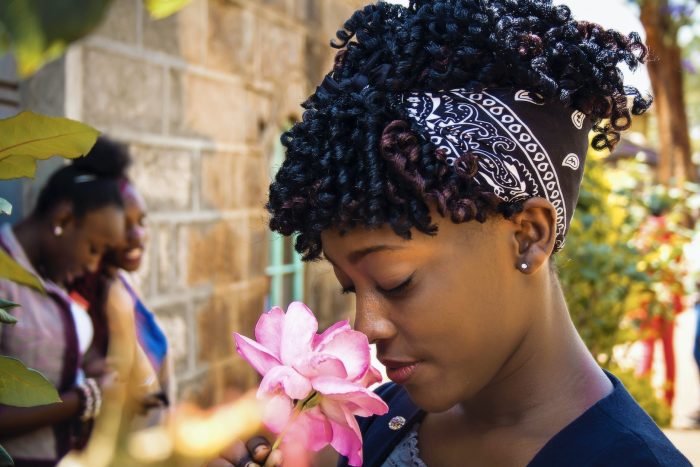A few years ago, I “read” my first audiobook, a novel called The Scent Keeper by Erica Bauermeister. I was captivated by this beautiful story from the first word. It shares about Emmeline, a young girl who lived on a remote island with her father. She experienced life largely through the filter of her sense of smell, and her relationship with scents.
This beautiful story encouraged me to look more closely at the power of our sense of smell.
Smell has been described as the oldest human sense. And of all our human senses (touch, sight, hearing, taste, and smell), smell is the most closely linked to our emotions and memories.
Have you ever smelled a familiar and much-loved scent and been taken back to a former time and place?
For me, the sweet floral aroma of the Australian wattle flower signals that spring has arrived. And the smell of petrichor as the rain droplets fall onto the dry, parched earth evokes childhood memories of summer days.
And who doesn’t go back to another time and place (and emotional state!) when we smell the scent of a former lover’s cologne?!
As Christmas approaches, you may yearn for the smell of gingerbread and mulled wine. Here in Australia, my favourite Christmas smells include fresh seasonal mangoes and seafood. Yum!
Scent has the power to remind us of both good and not-so-good memories. This is because the olfactory bulb (our brain’s smell centre) is a part of the olfactory system in our nasal cavities. And it just so happens that this smell centre is linked to the amygdala (our emotional processor) and the hippocampus (our learning and memory centre) in the brain.
The legendary Helen Keller understood the connection between smell and our memories. After losing her sight and hearing as a very small child, her interaction with the world was primarily through smell and touch. Here is what she had to say about her sense of smell:
~ Smell is a potent wizard that transports you across thousands of miles and all the years you have lived.
Helen Keller
Smells can warn us of physical illness/dysfunction
Scientists tell us that various states of sickness have unique and detectable odours. So, it is not surprising that bacteria and parasites have a sense of smell. Parasites use this sense to inform them which human host to infect, and various types of bacteria use smell detect the presence of other bacteria in their environment.
If states of sickness and dysfunction have unique odours, can we use pleasant and life-supporting odours to improve our holistic health? Body, mind, and spirit?
Yes we can.
We can also use scent and our sense of smell to heal
Physical healing through scent
A recent example of physical healing through scent relates to the coronavirus. Many COVID sufferers found they lost their sense of smell. Fortunately, many have discovered a way to smell again, with the help of smell training. This involves the active smell of four essential oils (rose, lemon, clove, and eucalyptus) for 20 seconds a day. This combination of essential oils is anti-microbial, and reduces mucous, inflammation, and cold symptoms.
Mental and emotional healing through scent
Essential oils also support our mental functionality. Research has shown that lavender, rosemary, sweet orange and chamomile essential oils reduce anxiety and stimulate the brain to increase neurotransmitter production.
Spiritual healing through scent
Can essential oils and other smell components also heal us spiritually?
Don’t forget the story of the Three Magi from the East who carried gifts of gold, frankincense and myrrh. These three substances were considered to be high-value items fit for a king. Did you know that two of these gifts (frankincense and myrrh) are fragrant plant-based resins from trees? In ancient times, they were melted to honour gods and ward off evil spirits. So they had, and still do, embody spiritual significance.
The intuitive gift of clairsalience (clairolfactance)
Some intuitives and highly sensitive people (HSPs) also have intuitive abilities or gifts known as clair senses. Among these is clear-smelling, also known as either clairsalience (or clairolfactance). This is the ability to detect smells without using our physical nose- and brain-based olfactory system. This ability helps intuitives to access insights related to our health, relationships, and other areas of our lives.
The fictitious Emmeline in The Scent Keeper had the gift of clairsalience. She sensed fear, danger, safety, and love through scent. And learned to trust where her intuition led her.
If you have the gift of clairsalience, embrace it and recognize it as a wonderful ability.
The gift of clairsalience is a natural safety mechanism that allows you to filter messages from the world. What you smell is a forewarning of what is to come. It allows you to take action, if needed, to keep yourself and your loved ones safe. It also alerts you to the emotional state of others.
Your clairsalience may manifest as warnings, or it may alert you to the presence of loved ones who have passed over, so you can comfort the loved ones still with you. Or you may be able to sense the ideal scent-based remedy to heal a client, friend or loved one from crippling anxiety or trauma.
And like Emmeline, you have this gift for a reason. It is one of your superpowers.







Read 12 comments and reply